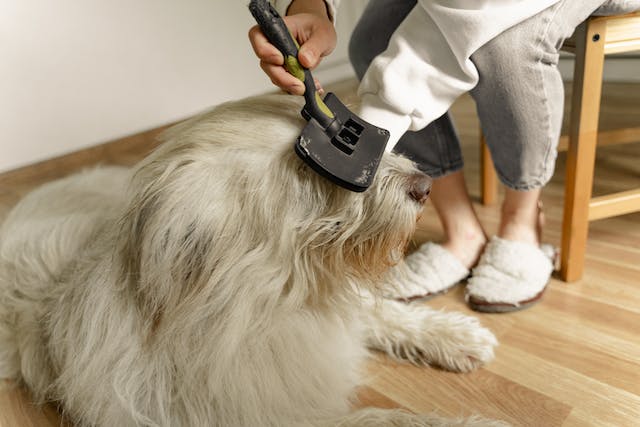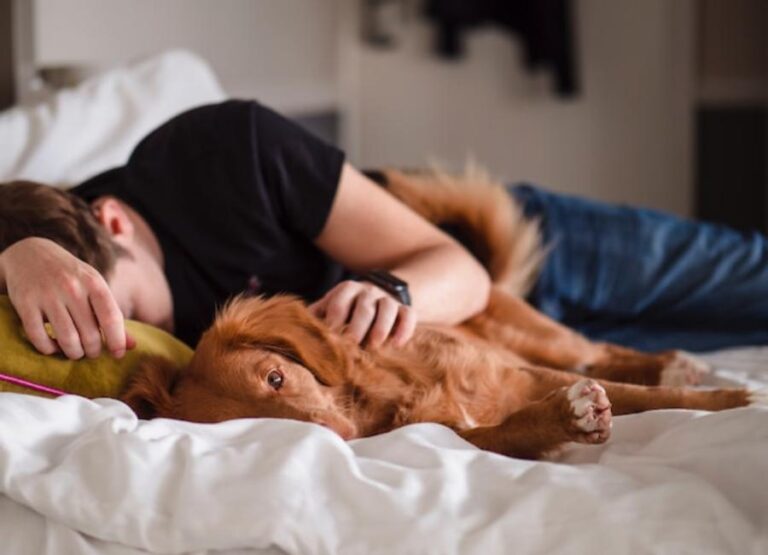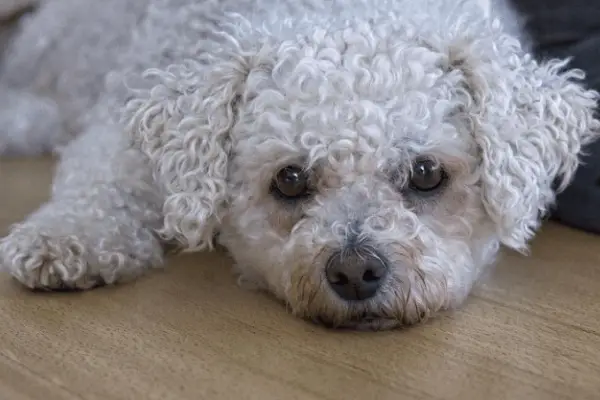12 Different Home Remedies for Dog Hairballs

Let’s discuss home remedies for dog hairballs! Is your furry friend suffering from those pesky hairballs that just won’t quit?
Don’t worry, I’ve got you covered with some amazing home remedies that will have your dog feeling fabulous in no time.
So grab a cup of tea, sit back, and let’s dive into these simple yet effective solutions together!
Home Remedies for Dog Hairballs
Home remedies for dog hairballs include regular brushing to remove loose hair, increasing fiber intake through the addition of pumpkin or psyllium husk to their diet, and providing them with plenty of fresh water to promote hydration and help move hair through their system.
Additionally, adding a small amount of olive oil or coconut oil to their meals can lubricate the digestive tract and facilitate the passage of hairballs.
However, if the hairball problem persists or becomes severe, it is important to consult a veterinarian for further evaluation and guidance.
Let’s break it down further…
Here are some of the most common home remedies for dog hairballs:
1. Regular Brushing to Remove Loose Hair
Regular brushing is an essential step in preventing hairballs in dogs. When you brush your dog’s coat, you help remove loose and dead hair, reducing the amount they ingest while grooming themselves.
This is especially important for dogs with long or thick fur that is more prone to matting and shedding. Use a brush or comb that is appropriate for your dog’s coat type.
For example, slicker brushes work well for removing loose hair from long, silky coats, while bristle brushes are suitable for short-haired breeds.
By establishing a brushing routine, you can keep your dog’s coat healthy, minimize shedding, and reduce the likelihood of hairballs.
2. Add Coconut Oil to the Dog Diet
Coconut oil is a popular natural remedy for various health issues in dogs, including hairballs.
It contains medium-chain fatty acids, such as lauric acid, which have antimicrobial and anti-inflammatory properties.
When added to your dog’s diet, coconut oil can help improve the condition of their skin and coat, reducing excessive shedding and the formation of hairballs.
Start by introducing small amounts of coconut oil into your dog’s food gradually. The recommended dosage is usually 1 teaspoon per 10 pounds of body weight, given once or twice a day.
However, it’s essential to consult your veterinarian before adding any supplements to your dog’s diet, as individual needs may vary.
3. Add Olive Oil to the Dog Diet
Olive oil is another natural remedy that can be beneficial in preventing and dealing with hairballs in dogs.
It acts as a lubricant and helps the hair pass through the digestive system more easily, reducing the risk of hairball formation. Olive oil also contains healthy fats that promote a healthy coat and skin.
To add olive oil to your dog’s diet, start with a small amount, such as half a teaspoon for small dogs, and gradually increase the dosage based on their size. You can mix it into their regular food.
As always, it’s vital to consult with your veterinarian to determine the appropriate dosage for your dog and to ensure there are no underlying health concerns that may be contributing to hairball formation.
4. Addition of Pumpkin to the Dog Diet
Adding pumpkin to your dog’s diet can be a helpful remedy for hairballs.
Pumpkin is rich in fiber, which aids in digestion and promotes regular bowel movements.
It acts as a natural laxative, helping to move hair through the digestive system, preventing the formation of hairballs.
To incorporate pumpkin into your dog’s diet, you can mix a tablespoon or two of canned or pureed pumpkin with their regular food.
Start with a small amount and gradually increase the quantity if your dog tolerates it well.
Remember, it’s important to use plain pumpkin without any added spices or sweeteners.
5. Addition of Psyllium Husk to the Dog Diet
Another home remedy to consider is adding psyllium husk to your dog’s diet.
Psyllium husk is a natural fiber supplement that helps promote healthy digestion and regular bowel movements.
It acts as a gentle laxative and helps move hair through the digestive tract. When using psyllium husk, it’s essential to follow the recommended dosage for your dog’s size.
You can usually find the dosage instructions on the product packaging.
It’s best to consult your veterinarian before introducing any new supplements to your dog’s diet.
6. Promote Hydration
Proper hydration is crucial for maintaining a healthy digestive system and preventing hairballs.
Encourage your dog to drink an adequate amount of water throughout the day.
You can do this by providing fresh water in a clean bowl and ensuring it’s easily accessible to your dog.
In addition to water, you can also offer your dog some low-sodium chicken or bone broth.
The extra moisture from the broth can help lubricate the digestive system, making it easier for hair to pass through.
7. Let the Dog Nibble Grass
One home remedy for dog hairballs is to let your dog nibble on grass. Grass acts as a natural laxative and can help your dog pass hairballs more easily.
However, make sure the grass is clean and free from pesticides or any harmful substances.
Supervise your dog while they’re outside to ensure they don’t eat any potentially toxic plants.
8. Addition of Omega-3 Fatty Acids or Fish Oil to the Dog Diet
Another home remedy is to add omega-3 fatty acids or fish oil to your dog’s diet.
These supplements can help improve the condition of your dog’s skin and coat, reducing excessive shedding and the formation of hairballs.
Omega-3 fatty acids have anti-inflammatory properties, which can also benefit your dog’s overall health.
Consult your vet for the appropriate dosage and the best supplement for your dog’s specific needs.
9. Wet Food in the Diet
Including wet food in your dog’s diet can also be helpful in preventing hairballs.
Wet food provides more moisture compared to dry kibble, which can aid in digestion and prevent the formation of hairballs.
The increased moisture content helps lubricate the digestive system, making it easier for your dog to pass hair through their system.
Additionally, wet food can help improve your dog’s overall hydration levels, which is important for their overall health.
10. Herbal Remedies
When it comes to addressing dog hairballs, some herbal remedies may help alleviate the issue.
One such option is slippery elm, which is known for its soothing properties on the digestive tract. You can find slippery elm in powder form at most health food stores or online.
Mix a small amount with your dog’s food to help promote smoother digestion and reduce the formation of hairballs.
As always, it’s essential to consult with your veterinarian before introducing any herbal remedies into your dog’s diet.
11. Provide Laxative Treats
To assist in the natural elimination of hairballs, you can offer your furry friend some laxative treats.
These treats are usually formulated with ingredients like pumpkin or psyllium husk, both of which have mild laxative effects.
They can help your dog pass hairballs more easily by promoting bowel movements.
Be sure to follow the recommended dosage instructions provided by the treat manufacturer.
If you’re unsure about the right product or dosage, consult your veterinarian for guidance.
12. Hairball Remedy Paste
Hairball remedy pastes are specifically designed to help prevent and treat hairballs in cats, but they can also be beneficial for dogs.
These pastes usually contain ingredients like mineral oil or petroleum jelly, which help lubricate the digestive tract and facilitate the passage of hairballs.
Check with your veterinarian to see if using a hairball remedy paste is suitable for your dog and to get recommendations on the right brand and dosage.
Remember, while these home remedies can provide some relief for dog hairballs, it’s essential to address the underlying causes as well. If your dog continues to experience hairball problems despite your efforts, it’s always best to consult with your veterinarian for a thorough examination and further advice.
Read more about hairballs in dogs.
Related Questions
What are hairballs in dogs and why do they occur?
Hairballs in dogs are clumps of fur that accumulate in the digestive tract. Dogs groom themselves by licking their fur, and when they swallow this fur, it can form into hairballs. They occur when the fur cannot pass through the digestive system naturally.
How can I tell if my dog has a hairball?
Signs that your dog may have a hairball include vomiting, retching, loss of appetite, constipation, or diarrhea. If you notice any of these symptoms, it’s best to consult with your veterinarian to confirm the diagnosis.
Are there any home remedies to help my dog with hairballs?
Yes, there are several home remedies that can help manage and prevent hairballs in dogs. These include adding a small amount of olive oil or coconut oil to your dog’s food to lubricate the digestive tract and help the hair pass through more easily. Increasing your dog’s fiber intake with foods like canned pumpkin or psyllium husk may also help move hair through the digestive system.
Can I use commercial hairball remedies for cats on my dog?
It’s not recommended to use commercial hairball remedies designed for cats on dogs, as they may contain ingredients that are not safe for dogs. Always consult with your veterinarian before using any over-the-counter products for your dog’s health.
How can I prevent hairballs in my dog?
Regular grooming is key to preventing hairballs in dogs. Brush your dog’s coat frequently to remove loose fur before it can be ingested, and consider adding a fish oil supplement to their diet to help maintain healthy skin and coat.
When should I seek veterinary care for my dog’s hairballs?
If your dog is showing persistent symptoms of hairballs, such as vomiting or a decreased appetite, it’s important to seek veterinary care. A veterinarian can help determine the underlying cause of the hairballs and recommend the best course of treatment for your dog’s specific needs.
Conclusion
So, there you have it—the simple and effective home remedies to help your furry friend combat those pesky hairballs! Remember, a little extra care and attention can go a long way in keeping your dog happy and healthy. So, why not give these remedies a try and say goodbye to hairball troubles once and for all? Your pup will thank you for it!


![10 Causes of Shih Tzu Itching and Licking [Useful Tips] Shih Tzu Itching And Licking](https://petcreeks.com/wp-content/uploads/2023/04/Shih-Tzu-Itching-And-Licking.jpg)
![How to Prevent Ear Infections in Dogs [15 Helpful Hints] How to Prevent Ear Infections in Dogs](https://petcreeks.com/wp-content/uploads/2023/09/pexels-mikhail-nilov-7474856.jpg)


